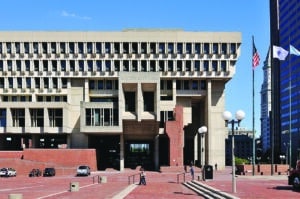Developers of large projects proposed in Boston will be asked to disclose their plans to ensure project teams are diverse, Mayor Michelle Wu announced Thursday morning.
The policy will apply to all projects 20,000 square feet or larger, Boston Planning & Development Agency Director Arthur Jemison told reporters at a City Hall press conference. The BPDA board of directors is expected to vote on the measure at tonight’s meeting.
“Boston is a growing city and we want to keep it that way,” Wu said. “We are proud of this growth but we need to make sure that the success and prosperity and opportunities in Boston extend to everyone to truly create common wealth.”
Developers will be asked to list the certified women- and minority-owned businesses involved in the project and what role they play at all phases of the development, including its ongoing operation, when they file a project notification form, a planned development area application or an institutional master plan notification form. Developers will also be asked to list strategies they’ll follow to boost supplier diversity – including goals they’ve set – strategies to develop other companies’ capacities, any workforce training programs, the development team’s membership and any information about the development team’s diversity, equity and inclusion goals that “helps provide a more complete understanding of the impacts of economic development.”
The city has no legal power to compel developers to include women- and minority-owned businesses in its project teams, unlike when it is selling off or leasing out city-owned land for development, so the policy will only be a request for now, Jemison said, and won’t factor into the BPDA’s decision to support or oppose a proposed project.
However, Boston Chief of Housing Sheila Dillon noted, the new policy has power to spark important conversations in the real estate industry.
“When you ask for information…it’s not a requirement but it gets people to stop and think about what we’re trying to do together,” she said.
The relative lack of diversity among the real estate developers working in Boston has long been a point of concern and conversation, both among city leaders and in the real estate industry. Even prominent Black industry executives like Greg Janey, president and CEO of Janey Construction Management, have noted they faced a “concrete ceiling” when trying to find new opportunities. Some real estate and construction companies and trade groups have put resources into initiatives like internship programs and talent pipelines, but significant obstacles remain.
City Chief of Economic Inclusion Segun Idowu said many local companies and residents were still being left out.
“There’s a tremendous amount of talent in our communities that we’re leaving on the table,” he said. “This is also an opportunity for our friends in the development community to show the work they’ve been doing.”
Idowu said the city “stands here ready” to support the development community in boosting participation by women- and minority-owned businesses and workers in its projects.
Jemison and Idowu said the city doesn’t currently have any kind of clearinghouse set up to connect interested developers with women- and minority-owned businesses, but said something like that could eventually be set up. Idowu also noted that private groups like the Builders of Color Coalition and the Foundation for Business Equity or Maven Construction’s Surge Contractor Incubator could help foster these connections.
Jemison added that that developers should make sure to highlight any of their own female and minority employees who might be working on a project.
Ultimately, Jemison said, the policy is important to making sure city residents see their own economic success in each new development in Boston.
“I want everyone to look at the buildings going up and seeing them making the city better,” he said.







